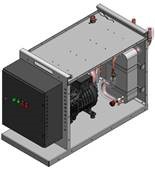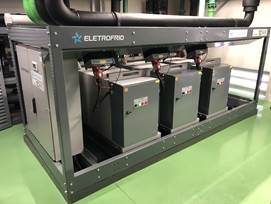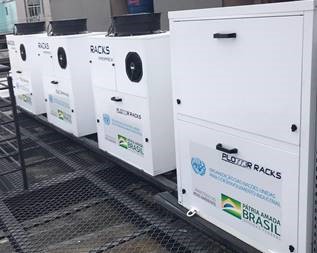Two of the country’s prominent supermarket chains report promising results after testing R-290 in their facilities, says Edgard Soares Pinto Neto, UNIDO Refrigeration Expert
In 2016, the Brazilian government launched Stage 2 of the HCFC Phase-out Management Plan (HPMP), with funding from the Multilateral Fund (MLF) for the Implementation of the Montreal Protocol. The plan provides, in general lines, the measures to be adopted until 2023 for the elimination of the consumption of 464.06t ODS (ozone-depleting substance). The United Nations Industrial Development Organization (UNIDO) is responsible for implementing projects in the refrigeration and air conditioning (RAC) sector.
UNIDO is assisting the Brazilian Ministry of Environment in providing technical assistance to 28 RAC companies in order to replace HCFC-22 in commercial refrigeration equipment and safely convert the production line and the facilities for storing and handling refrigerants.
Two of the biggest manufacturers of refrigeration equipment in the country, Eletrofrio and Plotter Racks, are part of the project with objectives to develop new chillers using an environmentally friendly refrigerant and to install these chillers in a local supermarket for demonstration purposes.
Both companies developed a modular chiller based on propane (R-290). The refrigeration equipment was designed to facilitate its safe installation and maintenance. It can be installed outside of the store or in a machinery room, keeping the R-290 out of the sales area, whilst only the glycol, a secondary fluid, is inside the store to cool the display cases or cabinets. The system was designed in a way that potential failures would be limited to only one module, while other modules would continue working.
In Brazil, chillers are usually charged with a refrigerant at the customer’s premises. This common practice had to be adjusted, as the flammability of propane requires additional safety measures. Thus, the companies created a designated and safe area in their factories to handle propane. The assembly area is equipped with a special charging machine for flammable refrigerants, leak detectors, recovery machine for defective units, ventilation system, sensors and alarms. Whenever a chiller needs to be charged with propane or whenever a defective module must be repaired, the service can be executed at the manufacturer’s safe area, eliminating the need for refrigeration specialist technicians in the supermarket workforce.
Eletrofrio Project
Eletrofrio was established in 1946 and is the largest company in the retail refrigeration sector in Brazil. The company produces components and systems for supermarkets, such as refrigerated display cases and centralised refrigeration systems. For this specific project, Eletrofrio developed a water-cooled R-290 chiller for medium-temperature applications with three different cooling capacities: 10,000, 20,000, or 30,000 kcal/h. A typical installation requires at least three modules, and it can be configured according to specific cooling demand.

Eletrofrio prototype
Being the first store in Latin America to use 100% natural refrigerant, the Condor Supermarket, in the city of Curitiba, in the southern region of Brazil, was selected through a call for expression of interest. The company installed six R-290 modules. Each module was designed to be as simple as possible and has a variable-speed compressor, a brazed-plate condenser and evaporator, an electronic expansion valve, a propane sensor and permanent airflow of refrigerant-containing components. The electrical panel is isolated and located outside of the refrigerant-containing module. Each unit has 20,000 kcal/h (23,26kW) cooling capacity and is charged with 1.9 kg of R-290, totalling 11.4 kg of propane in the machinery room. Besides cooling medium-temperature refrigerated display cases and cabinets, the glycol system serves as condenser for CO2 refrigerant, which is used for low-temperature display cases in subcritical operation.
When converting a refrigeration equipment from an HFC refrigerant to propane, the refrigerant charge is reduced approximately by 50%. The volumetric refrigeration capacity of R-290 is higher than that of R-134a, meaning a smaller compressor in place. In this specific chiller development, Eletrofrio obtained a charge reduction of 94%. This significant refrigerant reduction is justified by the adoption of a different system configuration. Eletrofrio shifted the system from a parallel compressor rack to a set of compact modular chiller. In addition, according to CO2 equivalent metric, the impact of the propane system is negligible. The propane system provides 99.99% t CO2 equivalent reduction compared with a similar capacity system charged with R-134a, which means a significant reduction in the total impact on climate. The cost of the modular chillers was five per cent more expensive than an R-134a parallel compressors rack. This difference in price is acceptable due to the fact that the components were bought as single units for this project, without the benefit of the lower prices of purchase in bulk. Comparing the propane solution with an R-134a parallel compressors rack in another store from Condor’s chain with comparable size and cooling demand, also located in Curitiba, the system with propane provided a three per cent electricity reduction over the period of one month. The system has been running for more than one year without a single leak and, compared with the other system, requires 30% less maintenance time, proving its reliability.

Eletrofrio modules installed at Condor Supermarket
Plotter Racks Project
Plotter Racks produces centralised refrigeration systems for the retail sector, including small supermarkets, hypermarkets and convenience stores. The company was established in 1995 and was the first company to produce and install a cascade system with CO2 in Latin America.
The Plotter Racks team, with the support of international consultant, Omar Abdelaziz, developed an air-cooled R-290 modular chiller for medium-temperature applications. Each unit has 10,800 kcal/h cooling capacity and a variable-speed scroll compressor, microchannel condenser, brazed-plate evaporator, propane sensor and a continuous ventilation system for the refrigerant-containing components. Each module is charged with 1.04kg of R-290. The system incorporates a remote control system that allows Plotter Racks monitor the performance of the system in real time, ensure routine maintenance and reduce management and maintenance cost for the client.
The selected store for the demonstration project is located in Juiz de Fora, in the southeast region of Brazil, and belongs to the supermarket chain, Bahamas. The store was also selected through a call for expression of interest and received three propane modules that were installed in the roof of the store. The propane system is used for cooling medium-temperature display cases and cabinets and to condensate the CO2 used for low-temperature cabinets. Although the installation is quite recent and is still in a monitoring process, the initial tests in Plotter Racks laboratory showed a COP increase of 12-15% in partial load, when compared with a similar cooling capacity system using R-410A.

Plotter Racks modules installed at Bahamas Supermarket
For both projects, there is no need for on-site handling of propane. From the beginning, the project was designed to manufacture modular units, facilitating the whole system. So, in case one module fails, only the defective unit is transferred to the manufacturer’s designated propane service area, where it can be safely maintained, while the required cooling demand can be covered by the remaining modules. This is a key achievement of the project regarding the safety and reliability of the system.
Flammability was the biggest issue, imposing a special configuration of the system and compatible components, leading to a more expensive chiller. Both companies designed the chillers to have the lowest possible charge, to be as simple as possible, to be self-contained, to work with continuous ventilation of refrigerant-containing components, and to be equipped with a propane sensor. Additionally, the manufacturing process was adjusted to reduce the chance of system failures. Each company developed a safety protocol to control the system operation. If the sensor indicates the presence of propane above a certain percentage of R-290 LFL (lower flammability limit), the system shuts down immediately. It is still possible that an eventual leak happens, but it is almost impossible or less likely to create a hazardous situation.
With the support provided by the Brazilian HPMP, Eletrofrio and Plotter Racks have introduced an environmental solution for the supermarket sector, which is expected to be a trend in Brazilian supermarkets in the coming years. The R-290 modular chiller will help both companies to develop new solutions and business models. These demonstration projects will also raise awareness regarding the advantages of using propane in refrigerating systems. The adoption of the R-290 will limit the future use of synthetic refrigerant with high GWP (global warming potential) in the following years, and the demonstration activities in Eletrofrio and Plotter Racks companies will result in 157,6t of ODS elimination.
 The author is Refrigeration Expert with United Nations Industrial Development Organization (UNIDO), and may be contacted at e.soares@unido.org
The author is Refrigeration Expert with United Nations Industrial Development Organization (UNIDO), and may be contacted at e.soares@unido.org
(The author would like to acknowledge Brazilian Ministry of Environment, Eletrofrio, Plotter Racks and UNIDO colleagues, who supported the implementation of the project and also contributed to this article.)
Copyright © 2006-2025 - CPI Industry. All rights reserved.